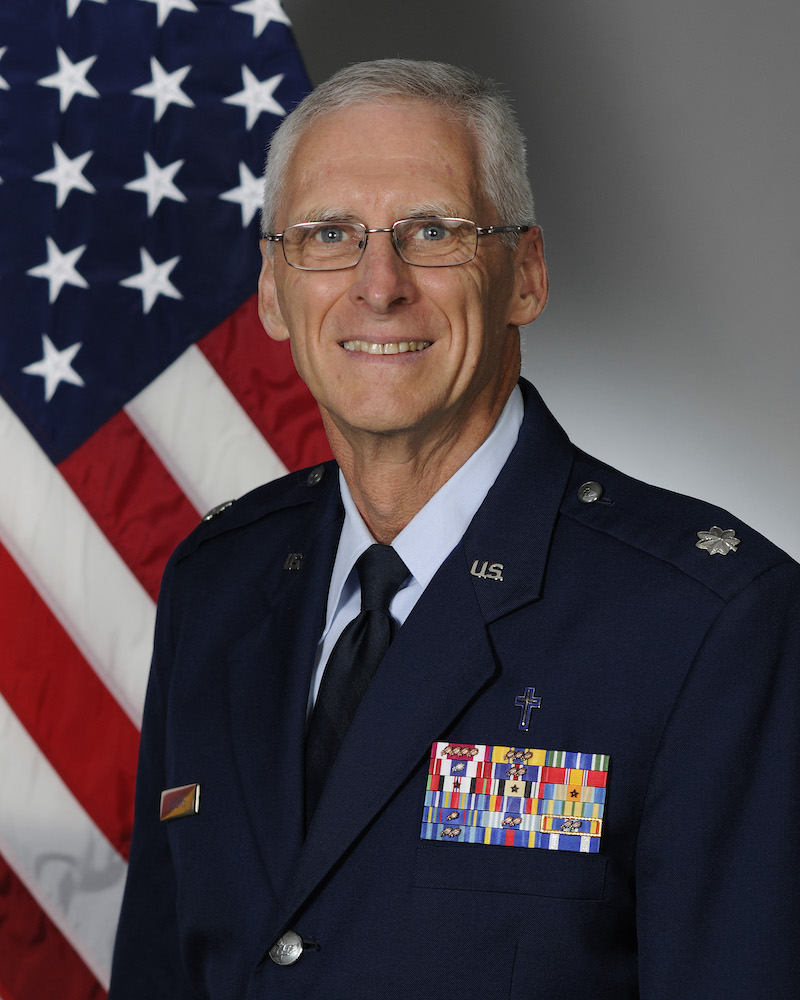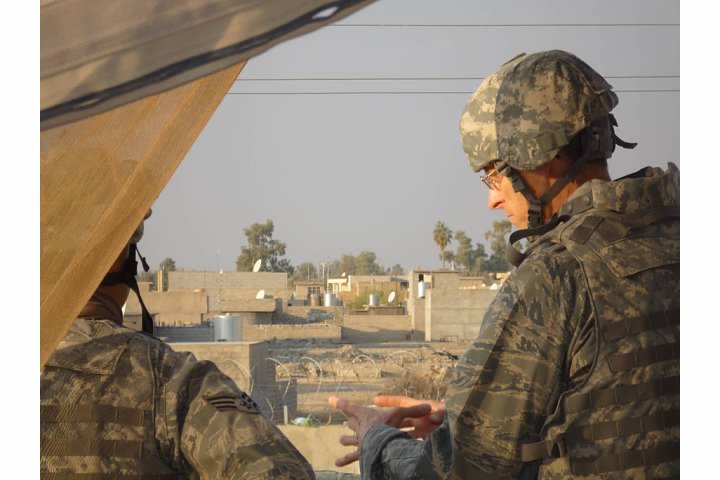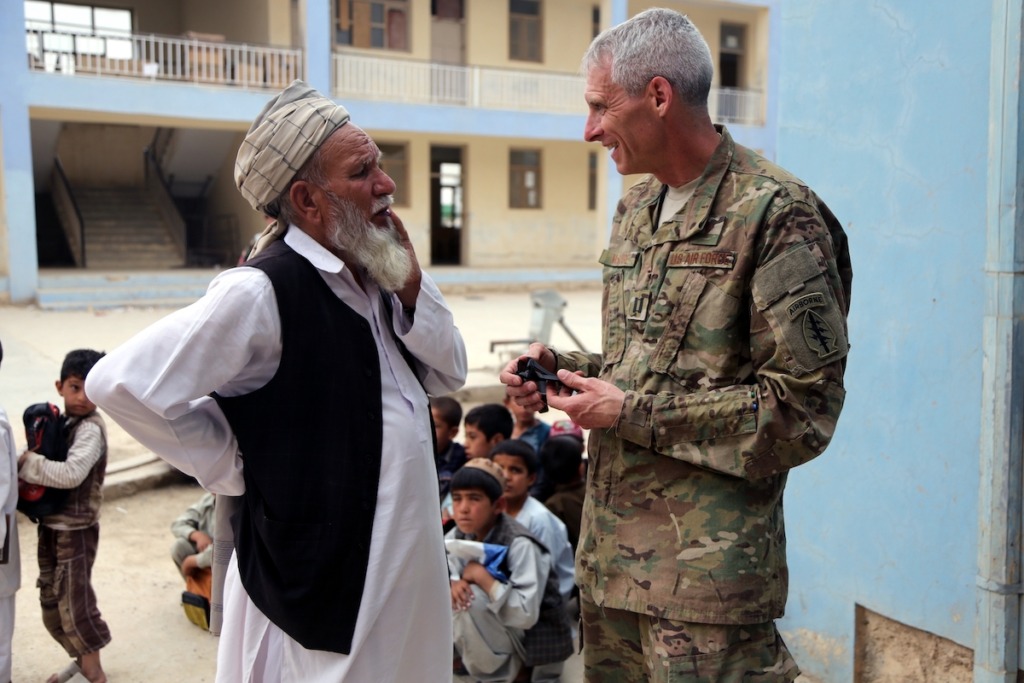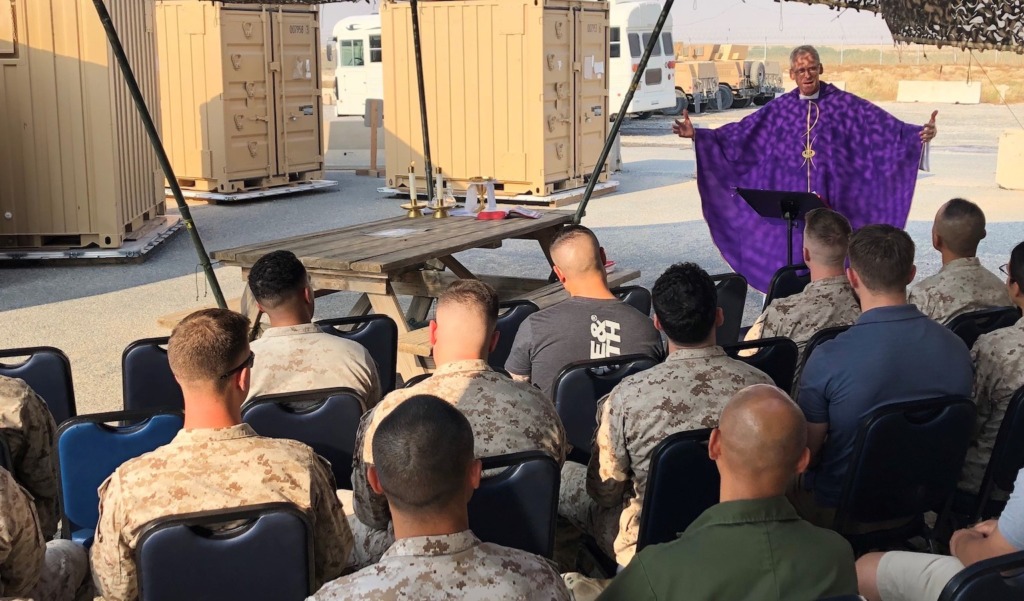Father McGuire humbled, rewarded by military, priestly service
“This is a gift. This is a joy. To be able to be a priest and a chaplain, that’s not work,” said Father David V. McGuire. “That’s like a love story. It’s beautiful, and I’m graced to be able to participate in it.”
Father McGuire is a lieutenant colonel in the United States Air Force and serves as chaplain for the 67th Cyberspace Wing, which has units in nine states.
The priest was promoted to lieutenant colonel effective Saturday, Oct. 1. He said having that rank “adds a bit of legitimacy, adds a bit of authority” to his mission.
“When I need to bring a religious accommodation issue to leadership, they’re going to hear it because the chaplain’s bringing this forward and it’s important, but there’s one level of ‘they’ll listen to you as a captain’ and there’s another level of ‘they’ll listen to you as a lieutenant colonel,’” he said. “They’ll still listen all the time, but it’s just access to having more influence in support of people’s religious freedoms.”

As a chaplain in the Air Force, Father McGuire networks with the home base chapel and local priests, often volunteering to celebrate Mass.
He also hears “lots of confessions” and does “lots of counseling,” which is very important because everyone in the wing deals with top secret information.
“I also hold that clearance, and so they can talk to me about stuff they can’t talk about with anybody else,” he said, even the servicemember’s home pastor.
“It isn’t about (the pastor’s) confidentiality,” he continued. “It’s that the military member promised not to discuss this information with anyone who didn’t have their classification or higher. It isn’t about you. It’s about them.”
He recalled an encounter with an Airman who “was in a bad way.” When she saw her chaplain’s top secret clearance badge, “the waterworks opened.” That day’s conversation eventually led her back to the Church, and she started a family.
“So, she was all fine, but life could have been very different if she didn’t have someone she could have talked with,” he said. “So, I’ve pushed that chaplains need to have that level of clearance.”
Growing in appreciation
Father McGuire said his faith life has evolved thanks to his military service.
“It has a depth to it that it didn’t have before because it has more shades of color,” he said.
As an Air Force chaplain, he encounters a “pretty broad spectrum” of religious beliefs, which has helped Father McGuire grow in his appreciation of his own faith and other people’s expressions of theirs.
“I don’t have to accept it as mine, but I certainly can be appreciative that they have it,” he said. “That’s something that I never learned in seminary.”
Father McGuire said that although he is a Catholic priest who celebrates Mass and meets the sacramental needs of those who seek confession, he is chaplain to the entire wing, regardless of religious affiliation.
He writes a weekly column that is sent to the wing – the current series is on “happiness as exploding into joy.” Information about various religious practices, such as reminders for supervisors about fasting regulations during Ramadan or Lent, are also included when applicable.
Father McGuire said that people often request meetings with him to discuss the column.
“I think it really gives people a sense of the holy, a sense of the sacred, and ‘he’s my chaplain,’” he said. “They may not go to church, they may not go to a mosque or a synagogue… but yet, they know who their chaplain is. And so I’m very respectful of that, very grateful for that.”
Pursuing the priesthood
Father McGuire intended to serve in the military before he considered the priesthood, but the two vocations became entwined.
As an undergraduate student at the University of Georgia, he was involved with Air Force ROTC when he felt a call to serve the Lord.
“It was Easter Vigil – I will never forget – Easter Vigil of 1980, and it was during the elevation of the chalice, and I just believed Jesus was telling me, ‘You need to be doing this,’” he said.
He told his master sergeant that he felt called to the priesthood. The master sergeant said that seminary was important and that Father Mc- Guire needed to go.
“If you don’t like it, you can always come back, and if you do like it, who knows, maybe you can come back to us as a chaplain,” he told the future priest.

“That was in 1980. I wish I knew that man’s name,” Father McGuire said. “I would have invited him to my commissioning. I have never forgotten that.”
He transferred to Belmont Abbey College in North Carolina to focus on discernment.
He was ordained a transitional deacon at Belmont Abbey in 1987 and was sent to the Diocese of Richmond to serve at St. Benedict, Richmond, for a year. He returned to the Abbey and was ordained a Benedictine priest in 1988.
Father McGuire said that he had been in discussions at the Abbey about it “feeling important” for him to be a military chaplain, and he thought that was the direction he was headed.
“Desert Storm came along, and I said, ‘I need to be a part of this,’” Father McGuire recalled, “and at that time, I was told, ‘No.’ And I ended up leaving the monastery, I felt so strongly about that.”
Bishop Walter F. Sullivan told Father McGuire that the Diocese of Richmond would welcome him. The priest was incardinated into the diocese in June 1995.
“Bishop said, ‘Do three years in the diocese, and then I’ll let you go to the military,’ so I said, ‘OK, that’s fine,” Father McGuire said.
After serving as a diocesan priest for a few years, he was in contact with the Navy. His service was to begin in less than a month when his dream came to a halt.
Bishop Sullivan reassigned Father McGuire to a parish whose pastor had been removed.
“I can still see him,” Father Mc- Guire said of the bishop. “He said, ‘I’m sorry to take the military away from you, but I need your help.’ And so I did that, and I had a great time there.”
Through his next two parish assignments, “the military thing was still in the background.”
While serving as pastor at Holy Trinity, Norfolk, the military kept coming up in Father McGuire’s spiritual direction sessions. Bishop Francis X. DiLorenzo was set to visit the parish, and Father McGuire decided to ask for a private meeting.
During the meeting, Father McGuire said Bishop DiLorenzo told him to “go and do good work, and if you want to come home, give me a call.”
Coming full circle
The priest contacted recruiters from the Army, Navy and Air Force. The Air Force recruiter was first to return his call and provided information about a “come and see weekend.”
“I went on the ‘come and see weekend,’ and came back and just started filling out papers and pursuing it,” he said.
In 2007, Father McGuire went to Officer Training School and was commissioned as a captain in the Air Force.

In 2008, he was deployed to Iraq, the first of five deployments he has completed in support of Operation Iraqi Freedom, Operation Enduring Freedom and Operation Inherent Resolve.
Father McGuire said that he has always considered military service important.
“It’s something that I felt called to, well, really since childhood,” he said. “And to be able to mesh it so beautifully with my priesthood and to be able then to bring that to so many people… it’s humbling, and it’s rewarding, and I love it.”
The priest said he saw the “raw need” when, as he was growing up, coverage of the Vietnam War was aired on TV.
“And then when you’re studying your Catholic history and you hear about some of our priests who are just flat-out heroes and walking saints because of what they were doing, it’s like, ‘I want to do that.’”
And he has.
Because his service has taken him all over the world, Father McGuire said he does not have a home parish in the way most Catholics do. Instead, it is the Church herself that provides “the bedrock and the foundation of home.”
“Everywhere I go in the world – everywhere, whether it’s over in the Middle East or different parts of Asia, different parts of the Americas or Europe – every time I walk into a Catholic church and I see that sanctuary candle flicker, I’m home,” said Father McGuire. “I’m home. And that’s worth everything to me.”

